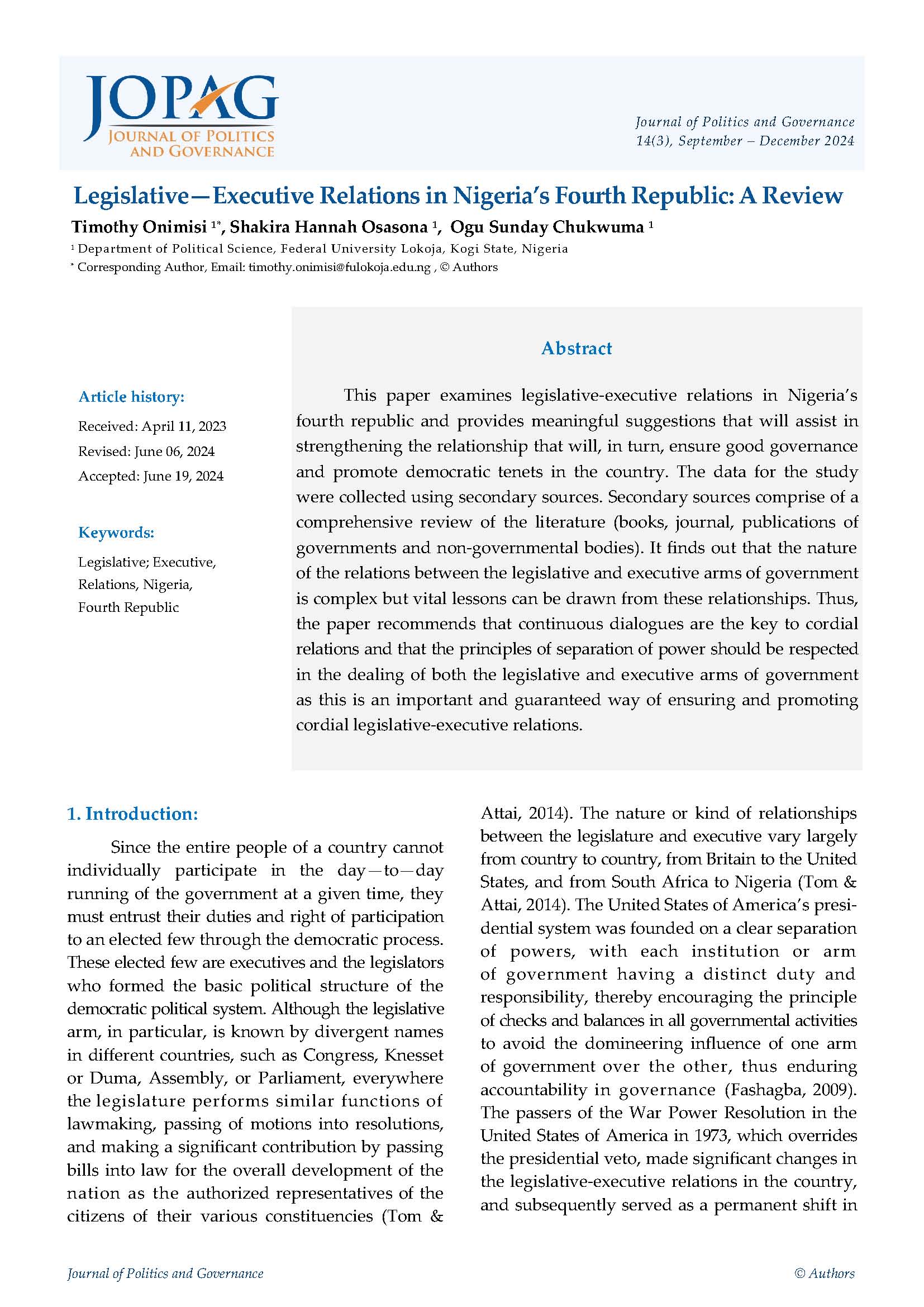Legislative-Executive Relations in Nigeria’s Fourth Republic: A Review
Main Article Content
Abstract
This paper examines legislative-executive relations in Nigeria’s fourth republic and provides meaningful suggestions that will assist in strengthening the relationship that will, in turn, ensure good governance and promote democratic tenets in the country. The data for the study were collected using secondary sources. Secondary sources comprise of a comprehensive review of the literature (books, journal, publications of governments and non-governmental bodies). It finds out that the nature of the relations between the legislative and executive arms of government is complex but vital lessons can be drawn from these relationships. Thus, the paper recommends that continuous dialogues are the key to cordial relations and that the principles of separation of power should be respected in the dealing of both the legislative and executive arms of government as this is an important and guaranteed way of ensuring and promoting cordial legislative-executive relations.
Article Details

This work is licensed under a Creative Commons Attribution-NonCommercial-NoDerivatives 4.0 International License.
References
Abonyi, N. (2006). Intergovernmental relations in democratic federations. Enugu: John Jacob’s Classic Publishers Ltd.
Adebo, A. (1988). The legislature: Overview and performance in Nigerian Second Republic. In V. Ayeri & K. Soremekun (Eds.), Apapa. Daily Times Press.
Aiyede, R. E. (2005). Executive-legislature relations in Nigeria’s emerging presidential democracy. UNILAG Journal of Politics, 2(1).
Aiyede, R. E., & Isumonah, V. A. (2002). Towards democratic consolidation in Nigeria: Executive-legislature relations and the budgetary process (Research Report No. 52). Development Policy Centre.
Akomolede, I. T., & Akomolede, O. B. (2012). Legislation as a tool for good governance in Nigeria: Legal matters arising. European Journal of Business and Social Sciences, 1(6), 61-68.
Aliu, M. (2013). Legislative corruption and democratic consolidation in the Nigerian Fourth Republic. Journal of Sustainable Development in Africa, 15(6), 101-112.
Anyaegbunam, E. O. (2000). Assembly handbook: A legislator’s companion. Lagos: FEF.
Bakare, I. (2009). Bicameral legislature: Justification, conflict and hierarchy: A case study of the National Assembly of Nigeria. The National Assembly Legislative Digest.
Bernick, E. M., & Bernick, L. E. (2008). Executive-legislative relations: Where you sit really does matter. Social Science Quarterly, 89(4).
Bhattacharya, D. (2014). Legislative-executive relations and US foreign policy: Continuum of consensus and dissension in strategic political decision process from 1970 to 2010. [Doctoral dissertation, University of Oregon].
Davies, A. E. (2004). The role of the legislature in fostering an efficient system of public finance. In A. A. Fajingbesi & I. O. Taiwo (Eds.), Fiscal federalism and democratic governance in Nigeria. National Centre for Economic Management and Administration.
Dudley, B. J. (1982). An introduction to Nigeria government and politics. Ibadan: Macmillan Press Ltd.
Eme, O. I., & Ogbochie, A. (2014). Executive-legislature feud in Nigeria: An examination of service chiefs confirmation, 1999-2014. Arabian Journal of Business and Management Review, 3(12).
Fashagba, J. Y. (2009). Legislative oversight under the Nigerian presidential system. The Journal of Legislative Studies, 15(4), 439-459.
Fashagba, Y. (2009). Legislative oversight under the Nigerian presidential system. The Journal of Legislative Studies, 15(4), 439-459.
Fatile, J. (2017). Legislative–executive relations and public policy formulation and implementation in Lagos State, Nigeria. OIDA International Journal of Sustainable Development, 10(6).
Hammond, T. H., & Butler, C. K. (2003). Some complex answers to the simple question “Do institutions matter?” Policy choice and policy change in presidential and parliamentary systems. Journal of Theoretical Politics, 15(2), 145-200.
Ihenacho, D. A. (2002). Obasanjo-Na’abba’s war without end: Who is up and who is down? Nigerian World. https://nigeriaworld.com/columnist/ihenacho/092302.html
Kabir, K. D. (2016). Between Obasanjo, Na’Abba & patriotism. Sunday Trust. https://www.pressreader.com/nigeria/sunday-trust/20160821/281977492032850
King, A. (1976). Modes of executive-legislative relations: Great Britain, France, and West Germany. Legislative Studies Quarterly, 11-36.
Laski, H. (1992). A grammar of politics. London: George Allen & Unwin.
Lijphart, A. (2004). Constitutional design for divided societies. Journal of Democracy, 15(2), 96-109.
Mbah, P. (2014). Demystifying intra-legislative conflicts in Nigeria: The Senate and the House of Representatives, 2007-2011. Mediterranean Journal of Social Sciences, 5(1), 677.
Michael, B. A. (2013). Inter-chamber relations in the Fourth Republic of Nigeria National Assembly. Pakistan Journal of Social Sciences, 10(1), 54-62.
Munzhedzi, P. H. (2017). The role of separation of powers in ensuring public accountability in South Africa: Policy versus practice. International Conference on Public Administration and Development Alternatives (IPADA).
Nwaubani, O. O. (2014). The legislature and democracy in Nigeria (1960-2003): History, constitutional role, and prospects. Research on Humanities and Social Sciences, 4(15).
Okoosi-Simbine, A. T. (2010). Understanding the role and challenges of the legislature in the Fourth Republic: The case of Oyo State House of Assembly. Nigeria Journal of Legislative Affairs, 3(1&2), 1-27.
Omotola, J. S. (2008). Democracy and constitutionalism under the Fourth Republic, 1999-2007. Africana, 2(2), 1-29.
Oni, S. O. (2013). Legislature-executive relations in the presidential system: A study of Lagos and Ogun States, Nigeria, 1999-2011 [Doctoral dissertation, Covenant University].
Onimisi, T. (2014). The politics of state creation in Nigeria and the economic viability of the existing 36 states. International Journal of Social Sciences and Management, 1(2), 64-68.
Onimisi, T. (2018). Trend of human right abuse in Nigeria: 1996-2013. International Journal of Advanced Studies in Social Science & Innovation, 2(2), 70-79.
Osuji, F. (2005, April 12). Osuji explained his role to the Senate Committee on Ethics, Code of Conduct and Public Relations. The Guardian (Lagos), pp. 1-4.
Pennings, P. (2003). Beyond dichotomous explanations: Explaining constitutional control of the executive with fuzzy‐sets. European Journal of Political Research, 42(4), 541-567.
Smith, R. A. (2010). Importing democracy ideas from around the world to reform and revitalize American politics and government. Greenwood Publishing Group.
Theophilus, A. A., & Perpetua, E. C. (2016). Budget padding: The Nigerian perspective. International Journal of Advanced Academic Research, 2(12).
Tom, E. J., & Attai, A. J. (2014). The legislature and national development: The Nigerian experience. Global Journal of Arts Humanities and Social Sciences, 2(9), 63-78.


